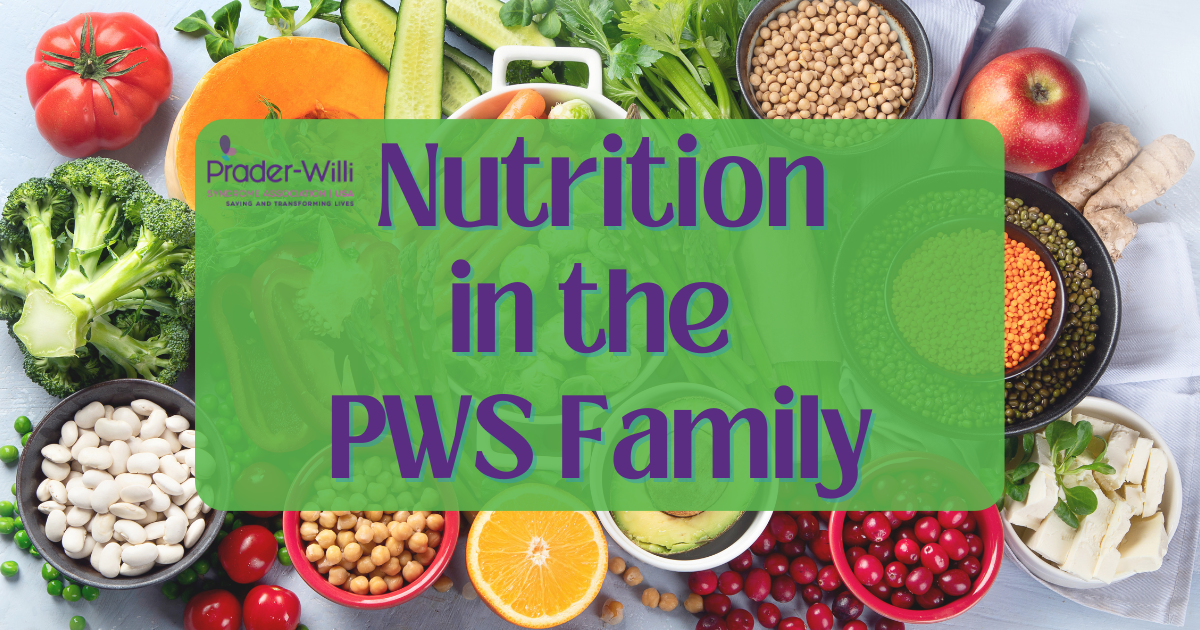Michael Tan, MS, RD, LDN, is a Dietitian who works with Dr. Jennifer Miller at the University of Florida Health. He spoke at PWSA | USA’s United in Hope Convention in June of 2023 and sees a large number of families in the PWS community. I reached out to Michael with some general questions about nutrition and diet pertaining specifically to our loved ones with PWS. Here are those responses.
Do you have standard advice you offer to newly diagnosed parents of babies or young children?
I like to remind families that although more strict, the diet for those with PWS is not extremely unique or specialized. The diet focuses on limiting sweet-tasting foods (and drinks) and refined grains while emphasizing balanced meals and snacks (protein and fiber).
What is a mistake or commonly held myth you see from families?
There are two common myths I see. The biggest myth is demonization of carbohydrates. While many people consume too many carbs, this does not mean carbs should be avoided completely or that they should be severely restricted. The focus should be on high-fiber complex carbs balanced with protein. Meals should not be carb-dominant, but also not carb-free (or low carb). Example: almond flour, while low carb, is not any “better” than a whole wheat flour. Lower carb does not mean better/healthier.
Another myth surrounds sugar. My recommendations focus more on limiting the taste of sweetness rather than sugar as an ingredient. Many foods may contain small amounts of sugar but still are OK to offer (whole grain breads and tomato sauce are two common examples) – because they are generally not sweet-tasting. On the other hand, there are many products that are marketed as “sugar-free” however still taste sweet (because they use alternative sweeteners), which is why I would not recommend them (common examples are things that are “light”, “diet”, and many “keto” products). It is important to focus on trying to avoid sweeteners/sugar alternatives (there is a negative physiological response in those with PWS). This not only includes artificial sweeteners (like sucralose, aspartame, acesulfame potassium, etc.), but also natural sweeteners (like stevia, monk fruit, dates/fruit, and erythritol/sugar alcohols). Do not be fooled by “No sugar and no artificial sweeteners.”
What are some important nutrition facts parents of younger children should know?
Portion sizes vary greatly – every child is different and even your own child may need different portions day-to-day. Some children may need seemingly large portions, others may need seemingly small portions. One of the most important things to focus on is appropriate growth and weight gain. If they are gaining weight at an excessive rate, then portions may be too large (and vice versa).
Also, snacks should not be scheduled. Snacks should be given “as needed”. Scheduling snacks promotes non-hunger eating (“feeding the clock”) and can exacerbate rigidity surrounding schedules. “As needed” snacks can help promote flexibility in schedules and tend to be given more for true hunger.
What are the components and ratios of a well-balanced meal?
- Protein (~1/3 of a meal)
- Non-starchy vegetables (~1/3 (or more) of a meal)
- Complex, high fiber carb (~1/3 of a meal)
What are some of the best/healthiest/PWS-friendly carbs?
Any WHOLE grains (preferably “100% whole”), starchy vegetable, bean, legume. We do not recommend any refined grains (“white” flour, white rice, etc.)
Do you have a go-to site to find PWS-friendly recipes?
No – simply focus on balanced meals/foods/drinks that are not sweet-tasting.
- Protein (~1/3 of a meal)
- Non-starchy vegetables (~1/3 (or more) of a meal)
- Complex, high fiber carb (~1/3 of a meal)
Is intermittent fasting a good idea for our loved ones with PWS?
We generally recommend 3 meals per day and snacks as needed. There is only limited research on intermittent fasting and zero research on intermittent fasting in PWS.
Is a low/no carb diet good for people with PWS? Why or why not?
For growing children, I generally do not recommend any “low carb” or “no carb” diet. Growing children need carbohydrates for growth, development, and energy. Low carb or no carb diets are extremely difficult to sustain long-term and do not set up children for success/independent living in the future. Low carb diets can negatively affect growth. For adults with Prader Willi this could potentially be an option, however there is no reason to severely restrict carbs. High fiber, complex carbs can easily be a part of a well-balanced meal.
How can families from cultural backgrounds where something like rice or bread is a staple navigate a diet that is healthy for someone with PWS?
I would recommend using a whole grain rice: brown, wild, black, red rice, etc. Quinoa can be a great substitute for rice as well. For bread I would recommend any “100% whole” grain bread. Limiting refined grains like white rice and white flour are important due to low nutrient density (lack of protein, fiber, vitamins, etc.). As with any carb/starch it is important to balance with protein and non-starchy veggies (and to avoid carb-heavy meals).
How can parents manage dietary needs of a child with PWS while also meeting the dietary needs of the PWS child’s siblings? Are there any key phrases or a thought framework to help with this?
It is important to treat all children in the household similarly and to focus on overall health and a healthy relationship with food to minimize the risk of disordered eating in siblings. Somewhat contrarily, I believe it is important to teach the child with PWS that they do have some restrictions that their siblings do not have. Generally, siblings may have a somewhat more flexible diet, larger portions, or need to eat more frequently – and this is important for the child with PWS to understand. I do not recommend siblings having to “hide and eat” away from your child with PWS – this promotes the idea that what the sibling is doing is “bad” and increases the risk of disordered relationship with food. If changes to the family’s diet are being made, it is important not to mention the PWS child’s name – do not single out the child with PWS, this can cause resentment – and to simply state that changes are being made to be a healthier family as a whole.
What are some of your favorite hacks/tricks that you’ve seen that seem to make life easier for PWS parents with regard to meals?
I think it is helpful to remember meals and snacks do NOT have to be fancy and you do not have to be a five-star chef. Meals and snacks can be as simple as cucumber (non-starchy veggie), a whole grain cracker (complex carb) with cheese (protein), and some almonds (protein) or something more traditional like green beans (steamed in microwave) (non-starchy veggie) and a turkey (protein) and cheese (protein) sandwich on 100% whole grain bread (complex carb). Meals can be made using only a microwave or toaster (or nothing). Convenient foods aren’t always “bad” choices.
When families meet with you, what do you want them to walk away with?
More confidence and less food anxiety.
Thank you Michael Tan for taking the time to share your knowledge and experience with the PWS community!
Share this!





 Perry A. Zirkel has written more than 1,500 publications on various aspects of school law, with an emphasis on legal issues in special education. He writes a regular column for NAESP’s Principal magazine and NASP’s Communiqué newsletter, and he did so previously for Phi Delta Kappan and Teaching Exceptional Children.
Perry A. Zirkel has written more than 1,500 publications on various aspects of school law, with an emphasis on legal issues in special education. He writes a regular column for NAESP’s Principal magazine and NASP’s Communiqué newsletter, and he did so previously for Phi Delta Kappan and Teaching Exceptional Children. Jennifer Bolander has been serving as a Special Education Specialist for PWSA (USA) since October of 2015. She is a graduate of John Carroll University and lives in Ohio with her husband Brad and daughters Kate (17), and Sophia (13) who was born with PWS.
Jennifer Bolander has been serving as a Special Education Specialist for PWSA (USA) since October of 2015. She is a graduate of John Carroll University and lives in Ohio with her husband Brad and daughters Kate (17), and Sophia (13) who was born with PWS. Dr. Amy McTighe is the PWS Program Manager and Inpatient Teacher at the Center for Prader-Willi Syndrome at the Children’s Institute of Pittsburgh. She graduated from Duquesne University receiving her Bachelor’s and Master’s degree in Education with a focus on elementary education, special education, and language arts.
Dr. Amy McTighe is the PWS Program Manager and Inpatient Teacher at the Center for Prader-Willi Syndrome at the Children’s Institute of Pittsburgh. She graduated from Duquesne University receiving her Bachelor’s and Master’s degree in Education with a focus on elementary education, special education, and language arts. Evan has worked with the Prader-Willi Syndrome Association (USA) since 2007 primarily as a Crisis Intervention and Family Support Counselor. Evans works with parents and schools to foster strong collaborative relationships and appropriate educational environments for students with PWS.
Evan has worked with the Prader-Willi Syndrome Association (USA) since 2007 primarily as a Crisis Intervention and Family Support Counselor. Evans works with parents and schools to foster strong collaborative relationships and appropriate educational environments for students with PWS. Staci Zimmerman works for Prader-Willi Syndrome Association of Colorado as an Individualized Education Program (IEP) consultant. Staci collaborates with the PWS multi-disciplinary clinic at the Children’s Hospital in Denver supporting families and school districts around the United States with their child’s Individual Educational Plan.
Staci Zimmerman works for Prader-Willi Syndrome Association of Colorado as an Individualized Education Program (IEP) consultant. Staci collaborates with the PWS multi-disciplinary clinic at the Children’s Hospital in Denver supporting families and school districts around the United States with their child’s Individual Educational Plan. Founded in 2001, SDLC is a non-profit legal services organization dedicated to protecting and advancing the legal rights of people with disabilities throughout the South. It partners with the Southern Poverty Law Center, Protection and Advocacy (P&A) programs, Legal Services Corporations (LSC) and disability organizations on major, systemic disability rights issues involving the Individuals with Disabilities Education Act (IDEA), Americans with Disabilities Act (ADA), and the federal Medicaid Act. Recently in November 2014, Jim retired.
Founded in 2001, SDLC is a non-profit legal services organization dedicated to protecting and advancing the legal rights of people with disabilities throughout the South. It partners with the Southern Poverty Law Center, Protection and Advocacy (P&A) programs, Legal Services Corporations (LSC) and disability organizations on major, systemic disability rights issues involving the Individuals with Disabilities Education Act (IDEA), Americans with Disabilities Act (ADA), and the federal Medicaid Act. Recently in November 2014, Jim retired.